Community college students thinking of transferring to a four-year university can access a new program to help with the application process and secure research internships at Stanford Medicine. Called Community College Outreach Program, or CCOP, the program is supported by former community college students, now at the Stanford School of Medicine, who understand what it means to move from a two-year college to a university.
"Despite what many people think, the challenge is not so much the academic part of the transfer," Teni Anbarchian, PhD, a mentor and medical student, said. "When I first transferred from community college, I would have never believed that years later I could get into Stanford."
Before medical school, Anbarchian attended Glendale Community College in Southern California for 2½ years before transferring to UCLA to complete her bachelor's degree. She continued her education at Stanford University, pursuing her doctorate in developmental biology and eventually beginning medical school. She's now in her second year of the MD program.
Anbarchian's path isn't unusual. Many students attend community college for two years before transferring to a university where they can earn a bachelor's degree. But that doesn't necessarily mean the process is easy, or that once you're in, it's smooth sailing. Her struggles to fit in and feel at home as a transfer student at a new university motivated her to get involved in, and eventually help run, the Community College Outreach program, she said.
A grassroots effort to close the divide
In the fall of 2020, developmental biology PhD student Wendy Wenderski, who attended Pasadena City College as an undergraduate, proposed the creation of the program to the developmental biology department's diversity, equity and inclusion committee.
The program, funded by the department of developmental biology, the Packard Foundation, the Office of Science Outreach and the Office of the Vice Provost for Graduate Education, offers mentorship, research training and application bootcamps to prepare community college students to transfer and achieve long-term success in science. Assistant professor of developmental biology Alistair Boettiger, PhD, and professor of developmental biology and of genetics Anne Villeneuve, PhD, advise the program.
Wenderski said the goals of the program are to give community college students a competitive edge in science and related fields, as well as increase recruitment and retention of people from diverse and underrepresented backgrounds. Those who are at a community college and seek research experience, even if they may not intend to transfer to a university, can also apply to the program.
Wenderski felt such a program would fill a gap in science education for community college students, who do not have research opportunities on their campus like students enrolled at universities.
"Entry into most science, technology, engineering and math career paths is contingent on the length and depth of research experience," she said. "Because community college students don't have on-campus research opportunities, they typically begin research after transferring, while students who enter four-year schools as freshmen can begin right away."
To help address that discrepancy, the program offers two types of paid internship opportunities for students enrolled in community college: a full-time summer internship, offered to seven students, and an internship that is 10 hours per week over the course of the school year, offered to 10 students.
Even so, social barriers often linger. Now that Anbarchian is on the other side of transferring, she wants to dispel the notion in potential transfer students and interns that they don't belong.
"They got accepted into the program. That means we saw potential in them," Anbarchian said. "It's not by chance; they are here because they deserve to be here."
The movement to support community college students is gaining momentum with several programs at Stanford, such as the School of Medicine's Stanford Research Experience for Community College Students, which also offers paid summer internships.
Strengthening the transfer student experience
For many of the program's students, completing a research internship at Stanford has helped solidify the direction of their careers.
For the past 10 years, Mark Trujillo has been a sous chef; he attended Le Cordon Bleu in San Francisco. He has a year and a half left at Cañada College in Redwood City, California, and Trujillo has yet to decide where to go after completing his community college coursework.
Trujillo applied to the program's research internship and was accepted this year. Now Trujillo is working in the lab of Villeneuve, studying Caenorhabditis elegans, a roundworm and model organism used to study genetics.
One of his struggles going back to school was "learning how to learn again," he said.
"In the kitchen you put your heart into a dish, and then you ultimately give it to someone to enjoy and that's it," said Trujillo. "In science, you put your heart into a project and sometimes it doesn't work out the way you want it to so it can be seen as a failure. But, really, it's just a learning experience."
The internship has solidified his plan to pursue a career in a science-related field, he said.
Stories like these inspire mentors and leaders to continue to grow the program, said Wenderski. They hope to increase the number of transfer students at Stanford as well.
"The goal of our program is to provide a confidence shift for students so they can go from a lack of confidence to 'What can't I do,'" said Megan Agajanian, PhD, a postdoctoral scholar in developmental biology, who currently runs the program.
"Students are here for the same reason as everyone else. We're all here to be scientists. We're here because we belong here. This program is helping make that happen," Agajanian said.
Photo courtesy of the Stanford Medicine Community College Outreach Program.
Top image: Summer Mentees (2022) stand together after their poster symposium on August 11th. From left to right: Sabrina Truong, Pearl Sikepe, Gianna Perez, Katherine Moses, Yesenia Puga, Mark Trujillo. (Photo courtesy of the Stanford Medicine Community College Outreach Program)






